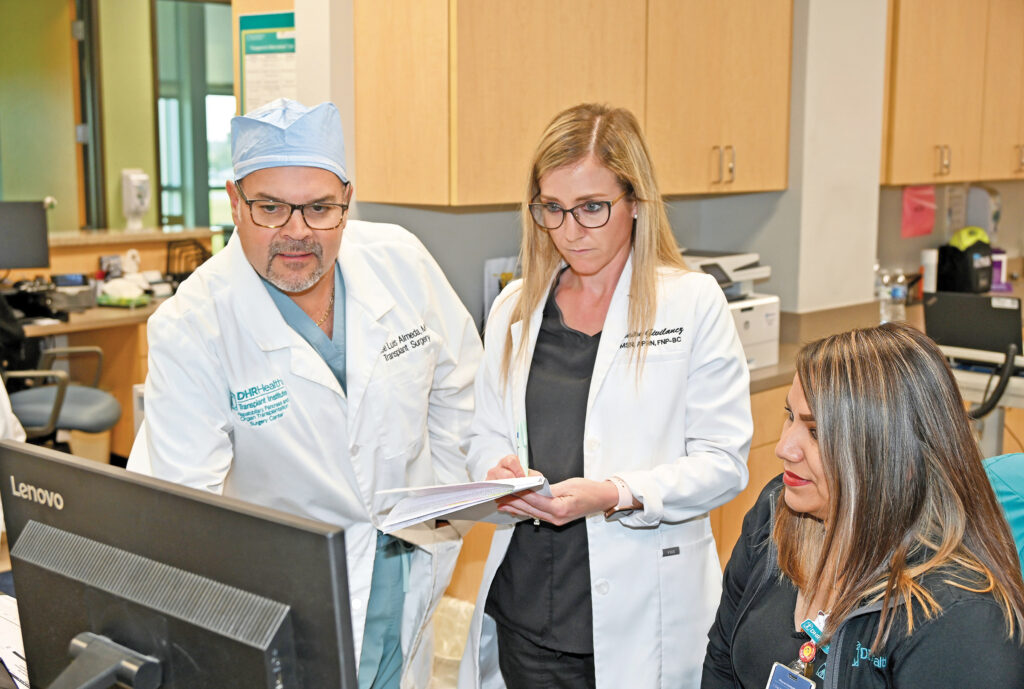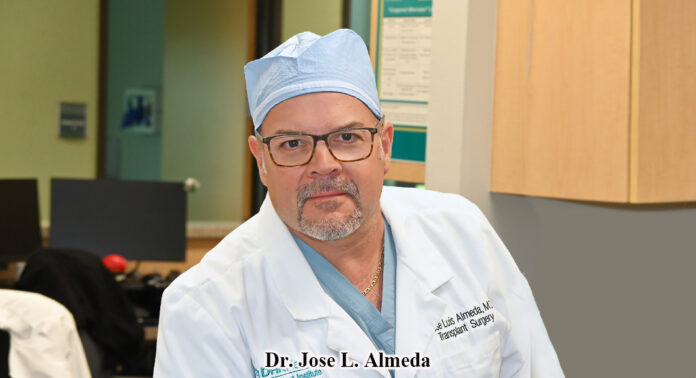A Surgeon’s Journey
Mega Doctor News
By Roberto Hugo González
In a recent conversation with Dr. Jose Almeda, Director of the DHR Health Transplant Institute, we explored his journey of bringing the first liver transplant service to the Rio Grande Valley. This achievement has yet to be accomplished south of San Antonio.
Dr. Almeda’s surgical roots trace back to the University of Texas in San Antonio, where he completed his general surgery training. Further improving his skills, he pursued two Fellowships in cancer and transplant surgery in Los Angeles at the University of Southern California. Returning to San Antonio, he joined forces with his mentors, engaging in liver and kidney transplants.
However, his outreach work in the Rio Grande Valley reshaped his career. While transferring patients for transplants to San Antonio, Dr. Almeda recognized their hardships requiring travel and lodging.
This realization propelled him to join DHR Health Transplant Institute in 2014; despite initial reluctance to leave his life in San Antonio, he had a new house and a new tractor for his cattle ranch!
Under his leadership, the institute has witnessed the inception of new residency training programs, a kidney transplant program, a liver hepatology program, and an advanced endoscopy program all the time offering the area’s ONLY dedicated Service Line offering specialized treatment for Cancers of the Liver and Pancreas.
Now, Dr. Almeda is on the verge of fulfilling a decade-long dream: to offer the first liver transplant in the Rio Grande Valley. He emphasizes the importance of this service, given the current need to travel to distant cities like San Antonio, Houston, or Dallas for such procedures.
Dr. Almeda is optimistic about success rates, aiming for over 90%. He highlights the critical nature of liver transplants, allocated based on the severity of illness rather than on a first-come, first-served basis, unlike kidney transplants.
Post-transplant care also varies significantly between the two. Kidney transplant patients typically have a hospital stay of around four days, waiting for their kidneys to function. In contrast, liver transplant patients, often sicker, may stay for a week or even longer.
This pioneering effort by Dr. Almeda and his team at the DHR Health Transplant Institute marks a significant milestone in healthcare accessibility and quality for residents of the Rio Grande Valley, bringing cutting-edge medical services closer to home.

Dr. Almeda is a skilled surgeon specializing in Hepatobiliary and Pancreatic Surgery. He is proficient in both open and laparoscopic methods, focusing on treatments for pancreatic cancer, liver tumors, and bile duct injuries. Dr. Almeda’s medical education was completed at the University of Texas Health Science Center in San Antonio, where he also undertook his residency. Further enhancing his expertise, he pursued fellowships in liver and kidney transplantation, followed by an advanced fellowship in hepatobiliary and pancreatic surgery at the University of Southern California.
The DHR Health Transplant Institute has been making significant strides in preparing to offer liver transplant services in the Rio Grande Valley, a pioneering effort spearheaded by a dedicated team of specialists.
The foundation for these services was laid by establishing a hepatology program, the only one in the valley, led by capable GI doctors and supported by an extensive team, including mid-level providers and physicians. This program not only treats patients with liver diseases but also identifies those who require liver transplants, a need previously met only by facilities in San Antonio, Houston, or Dallas.
Key to this expansion is the recruitment of specialized personnel. The team includes Dr. Fernando Membreño and two additional hepatologists. The institute has also hired Dr. Pamela Chavero, the only transplant anesthesiologist in the area specializing in liver transplants. Joining them will be Dr. Eduardo Fernandes, a seasoned surgeon with over 2,250 liver transplants to his credit, and a third transplant surgeon to ensure round-the-clock availability for the demanding transplant procedures.
The institute adheres to government patient education and support requirements, providing extensive educational resources through nurses and coordinators. They have set up a dedicated conference center for pre-and post-transplant education, emphasizing the critical role of patient understanding in the transplant process.
Insurance coverage for liver transplants is comparable to kidney transplants, largely dependent on individual policies. The institute guides patients through the complexities of insurance coverage and copays, ensuring they understand the financial aspects of their treatment.
Innovation is also a key focus, with the acquisition of Thromboelastography (TEG) equipment to monitor patients’ coagulopathy during surgery. These machines are vital in determining the need for blood, plasma, platelets, or cryoprecipitate during a transplant. However, Dr. Almeda emphasizes that the real strength of their program lies in their skilled and dedicated personnel.
Awareness and early detection of liver issues are crucial. The institute encourages regular check-ups, particularly for individuals over 40 or those with obesity. The leading causes of liver transplants in the U.S. are Hepatitis C, alcohol abuse, and fatty liver due to poor diet. In the Rio Grande Valley, the predominant issue is fatty liver resulting from obesity, leading to cirrhosis.
This comprehensive approach by the DHR Health Transplant Institute, from patient education to state-of-the-art medical technology and skilled personnel, is setting a new benchmark in liver transplant services in the Rio Grande Valley, offering hope and advanced care closer to home for many patients.
As the DHR Health Transplant Institute nears the launch of its liver transplant services, Dr. Almeda shared insights on the importance of early detection of liver diseases and the lifestyle changes essential for maintaining liver health.
One of the primary symptoms indicating advanced liver issues is jaundice, characterized by yellowing of the skin. Dr. Almeda stresses the importance of regular follow-ups with doctors and liver lab tests to catch any issues early. The institute actively engages in community outreach, offering free Fibro Scans, a non-invasive method similar to ultrasound, to assess liver stiffness and detect fatty liver.
Addressing lifestyle factors, Dr. Almeda emphasizes the need to avoid excessive carbohydrates and sugary drinks, which are prevalent in local dietary habits. He observes that many in the community prefer carbonated drinks like Coca-Cola over healthier options like water or sports drinks, contributing to dietary issues.
To prevent conditions leading to liver complications, Dr. Almeda advocates for a simple yet effective approach: eat less, move more, and maintain a healthy weight. He acknowledges the challenges posed by genetic factors and recommends consulting doctors for potential solutions for weight loss.
Reflecting on the journey of bringing the liver transplant service to fruition, Dr. Almeda expresses gratitude for the support of the DHR Health Transplant Institute. The upcoming launch of the liver transplant program marks the culmination of a decade-long dream, a milestone in healthcare for the Rio Grande Valley.
Beyond his professional life, Dr. Almeda reveals his passion for cattle ranching. He finds solace in his off-duty hours working with Wagyu cattle, digging holes with his tractor, mending fences, and tending to horses and chickens. This hobby traces back to his roots in Del Rio, Texas, a place he describes as the epitome of ranch country.
Dr. Almeda’s connection to his rural upbringing and his commitment to advanced medical practices at the DHR Health Transplant Institute embodies a unique blend of personal and professional dedication, bridging the gap between healthcare innovation and traditional lifestyle values.









